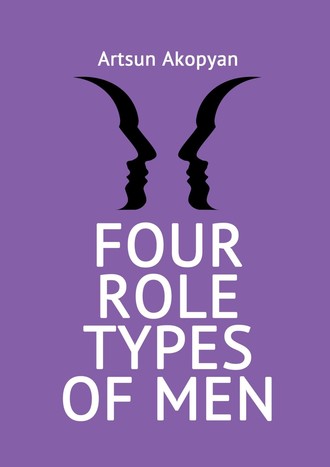
Полная версия
Four Role Types of Men
The Director is a serious and thrifty person. Before committing any “impulsive” acts, he will carefully calculate all the consequences!
Get ready for the fact that some time after the wedding, you will begin receiving a lot of instructions from him on how to behave and what to do. The Director likes to command. Giving orders to others is his natural state of existence.
Of course, he can get a clean towel out of the closet, wipe the table with a rag, or make coffee himself. But why should he do it if you are within reach? He has more important things to do. Why don’t you put off your petty chores and do what he asks? He is absolutely sure that would be good for both of you.
By the way, he does not know how to ask politely. His requests, even if the magic word “please” was in them, strangely sound like military orders. When you demand, “Watch your tone,” the Director looks perplexed: “what’s wrong?” He is sure he did not insult you! He did not even raise his voice!
Your attempts to show him how to express requests politely will lead to nothing. When you say, “Pass me the napkin,” your words sound tenderly and are pleasant to the ear, even if there is no “magic” word. The Director may try to copy your intonations, but the result will be inadequate. The phrase will sound either like a military command again, or a caricature.
Do not crumple the napkin requested by the Director to throw it in his face. He is not an Actor, and will never be one. Do not demand the impossible from him! You both have to adapt to each other.
Feelings of a loved one, unlike those of strangers, do matter to the Director – at least, those that he was able to notice. He will try to make you happy in what he considers important. For example, he may buy the furniture set that you liked, or repaint the house walls if you want another color.
But more often than naught, he himself knows what is best, and may ignore your requests. He will not change a chandelier if he believes that it fits in the living room perfectly. He will never put your piano in the living room if you are a doctor or a lawyer, and not a music teacher. The explanation will be simple: “I don’t wanna listen to ‘Chopsticks’ all day!”
It is impossible to compel the Director to do something against his will. If you persist, he will resist further, and you might have a row with him. Not understanding your logic, he can come to the conclusion that you are foolish. Does a foolish person have the right to give orders? Of course not. The Director will be firmly convinced that he has to make decisions himself without consulting you.
This man admires bright, strong-willed, successful, self-confident women, but wants you to be homely, modest, taciturn and obedient. It is hard to be all in one. Is it worth trying?
Yes, it is.
If you manage to adapt to the Director (and he to you), then you will feel as safe as houses with him.
He will make your home comfortable, good-looking and safe enough to endure any wind or earthquakes. He will keep the interior and exterior clean and in order, and expect the same actions from you.
You will develop a stable and trusting relationship. The fuss and turmoil of this world will be left out! Your marriage will resemble a large ocean liner, which confidently floats on the waves of life, overcoming any storms easily.
The only danger that could threaten it is a perfect calm. That is, a monotonous life that generates boredom. What if the Director wants to have a good time with other women?
Don’t worry: if you have coped with all the previous problems, you will find a solution to this one, too.
Actor
The Actor’s temperament type is choleric.
He is sure that the world was created just for one single purpose, to applaud his ingenious performance.
The Actor is energetic, active and optimistic. He is a holiday man!
Where can you meet such a wonder? Most likely, on a real holiday like a birthday party, an anniversary, or a wedding – at places where people come to relax, chat, and have fun.
How can you identify the Actor if everyone is trying to seem relaxed and witty? That’s easy! It is simply impossible to overlook him.
The Actor will certainly be in the spotlight. For example, he will perform the duties of a toastmaster or seize the initiative from the one who has already been appointed toastmaster – and he will do so naturally.
The Actor does not make any special efforts to stand out. He just can’t behave in a different way! Why?
A gathering of people activates his nervous system, causing a mental uplift close to euphoria. Every cell of his absorbs the energy of others, as if recharging from it.
Does that mean that the Actor is an energy vampire?
No! On the contrary, he is a donor! Amplifying the received impulses, he sends them back to people. He is not able to sit in a far corner and isolate himself from others. He wants to talk, to evoke smiles and laughter, and to surprise and delight everyone!
Alas, life consists not only of holidays. People spend much of their time at work, which also applies to the Actor. But he is unlikely to be found among employees of archives, libraries or account department – places where diligence and concentration are required. He is most likely a sales manager, guide, journalist or actor at a theater.
The Actor is attracted by novelties, so he rearranges his furniture every three months. Each time, he says this is the best positioning he has ever seen.
The Actor loves traveling. He will spare no time or effort if the adventure promises to be exciting. He will ride a quad bike through the swamps, climb a mountain, and fly a paraglider off a canyon. There are no spectators who would applaud him and shout “bravo,” but that is why he took a camera with him! As soon as he has access the Internet, everyone including friends, relatives and colleagues will see his adventures. The whole world will! “You are a hero!” his boss will say in surprise, before offering him a higher position.
That’s how the Actor thinks. And he is very surprised when his expectations are not fulfilled. He feels upset for a short time, but then finds a logical explanation: the swamps were not swampy enough, and the mountain should have been a little higher. Okay, next time he will choose a better route. Then everyone will be delighted for sure!
Money is not a top priority for the Actor. Most of all, he craves recognition and praise for what he does at work. He constantly struggles for quick development within the company, putting forward new ideas and fighting those who are lazy, incompetent or silly.
If his behavior suits his superiors, the Actor receives his portion of glory – most often, a very small one.
A boss’s condescending smile and an approving pat on the shoulder are enough for him. With that, he can move mountains!
But if the Actor’s activity inadvertently hampers the life of a key figure in an organization (usually the Scriptwriter or the Director), he gets into trouble. The superiors start finding faults with him and penalize him for trivial things, like arriving late for work by two minutes. Not understanding the root of the problem, the Actor tries to work even harder and prove his point in arguments with co-workers and supervisors, expressing a lot of emotions and straining his nerves. He does not notice that his initiatives only make the situation worse.
In the end, the Actor gets tired of the struggle. He leaves the job and enjoys the freedom. “Why did I suffer so long?” he thinks. “Why didn’t I quit this filthy office earlier? There are many others in the world where my talents will certainly be appreciated!”
The Actor can harbor such illusions for years until he realizes that the problem is within him. To others, he seems to be a boaster, a clown, an adventurer, a shallow person not adapted for life. His energy and enthusiasm are used by more balanced types as long as they benefit from him.
When the Actor realizes this fact, he has a chance to correct his behavior to finally find his permanent place in the sun.
How does the Actor develop relations with women? What can you expect from him?
His nature is exposed in this aspect of life, too. Unlike the Director, you will never get bored with him. He is able to accept your weirdest plan and begin to implement it immediately. For example, he will agree to travel three hundred miles right now to a pop star concert if this is your favorite pop star. He might not even like pop music, but he loves adventures! With the Director, the answer would be negative. He would say that he had completely different plans for the evening (like going to the gym or surfing the Internet at home) and you should have articulated your desire the day before yesterday, or even better last week so that he could estimate its worth and feasibility.
The Actor is good company. Unlike the Scriptwriter, he does not have encyclopedic knowledge, but all his stories are vivid, full of emotions and therefore memorable.
But he is not able to give out energy endlessly. Although his activity can last several hours in a row, fatigue and apathy inevitably come. The fireworks end. The Actor needs to lie down and sleep to regain vigor. He cannot live and work evenly like the Director or Scriptwriter. His nervous system is different.
At such a time, it is better to leave him alone. If you start telling him about your problems and he starts snoring, you need to check yourself to ensure you are not offended. His seeming disinterest is not his attitude towards you, but his physiology. Repeat your story again when he wakes up. You will get the emotional response you were counting on.
The Actor’s mood can change rapidly. He easily switches from thoughtfulness to activity, from nervousness to relaxation. He gets annoyed quickly, but just as quickly calms down. The most ordinary joke can cause him to burst out laughing (the Scriptwriter and Director would only smile in response, the first one more likely out of politeness).
The Actor strives to be a man of his word, but this does not always work. He truly believes in his promises the moment he gives them, but halfway, can be distracted. His attention switches to a new amazing object or event, and the promise completely slips from his mind.
For example, the Actor arrives home in the evening without having bought the shampoo and mosquito repellent you asked for that morning. This is not because he does not love you. He was distracted, that’s all!
But when he is ready, he will immediately turn around and rush in search of the thing you need. When he returns with the shampoo or repellent, he will expect praise from you. And he’ll be terribly offended if you don’t give it to him!
In general, praise is the main thing that he wants from you (apart from sex, of course). You can cook him a delicious dinner, wash his clothes, and wipe dust off of his computer, save him from mosquitoes… Everything will be wasted if you are not enthusiastic about his heroic deed – after all, he traveled to nine stores in no time and found “your shampoo” in the tenth one!
The Actor is not punctual. If he says, “Come outside, I’ll drive up in a minute,” do not rush. For him, a minute is a loose concept. His “minute” can last six seconds or a quarter of an hour. It is useless to make a fuss over this. He sincerely promises to “never be late again,” but quickly breaks his promise unintentionally. No doubt his reason will be compelling: “The bridge collapsed.” Or, “My boss called me up to his office.”
The Actor is able to arrive on time – for example, at work – if a registration terminal is installed at the entrance. But it is not easy for him. He puts on clothes in a hurry, drives a car violating traffic laws and gets into his office a second before being late. Needless to say, this can lead to his nervous exhaustion over time!
Since the Actor is always in a hurry, he has no time to put things in their place. Every morning he rushes about the house, opening all of the cabinets in search of his shirts and socks. The search is simplified by the fact that things fall out of there themselves, because the shelves are stuffed with random items! His money, keys, and driver’s license can also be anywhere – on the fridge, on a bathroom shelf, in the folds of the sofa.
Putting things in order demands great volitional effort on his part. His desire to tidy up the house can be caused by an emotional impulse with a vow he made to “stop this mess once and for all,” or by the news that some guests are coming around. However, the Actor is able to clean his entire home in five minutes to avoid shame and receive praise!!
To sum up, the Actor is unbalanced, boastful and disorderly, but at the same time energetic, optimistic and witty.
He would not succeed in remaking himself from the Actor into the Director or Scriptwriter even if he wanted to, as the role type is inherent nature from birth, but he can still correct and direct his behavior. Someone should explain to him why and how it should be done if he does not know himself.
Spectator
The Spectator’s temperament type is melancholic.
It is the desire of the Spectator’s heart that good always conquer evil, and that the participants of the play that is life be fulfilled and happy.
Note that the Spectator wishes not only main characters of life receive their due, but that all of the actors, including secondary ones, get what they desire. As for negative characters, the Spectator does not feel hatred for them. He is eager to consider the motives of their actions, to feel sorry for them and forgive them, because they are not to blame for being mistaken.
To the Spectator, to “conquer evil” does not mean to “destroy,” but to “re-educate”. He is against violence in principle!
However, re-educating the Spectator himself (as well as any other adults) is not so simple. He has his own unshakable principles. The main one can be formulated as follows: “All people are good.” Therefore, according to his beliefs, help should be given to everyone that is in a difficult situation. It can be a close or distant relative, a friend, a random passerby, and even an enemy.
If the Spectator cannot help someone, for lack of power, resources or understanding of the situation, he feels the need to at least to show compassion, to cheer up, to comfort the poor person – essentially, to express his unconditional support.
The Spectator wants people’s faces to radiate joy and kindness. Therefore, he evaluates the success or failure of any business not so much by the final result as by the psychological state of its participants. Are they satisfied with what and how they did? Did they manage to get along with each other? Has their mood improved or worsened?
If someone was offended by the interaction, the Spectator considers his mission a failure.
For the Spectator, as well as for the Actor, emotions are more important than the matter. But, unlike the Actor, the Spectator does not seek to flaunt his personality and receive praise. He watches others and does everything in his power to make them happy. Achieving this goal, he feels fulfilled. That is all he needs!
The role played by the Spectator in life and the role of a spectator in a real theater are very similar. A good theater visitor is not only an observer, but also an active participant of the action. He or she supports actors with applause, laughs in response to jokes and cries during the most dramatic portions of the play. Sometimes (if asked), they may go on stage themselves and say a few words, or even define the plot development in a modern interactive performance!
The same applies to the Spectator’s role type, and his main objective is always the same: universal happiness.
How does the Spectator behave in real life? First of all, he tries not to cause inconvenience to anyone.
He drives a car carefully, following road signs and the speed limit. In public transport, he gives way to elders and children. In stores, he never goes to the cashier’s desk out of turn. He is used to saying “please” and “thank you,” and smiling at everyone.
The Spectator is a vulnerable person. If insulted (at a store, for example), he suffers deeply, although outwardly remains calm. The rude person is unlikely to even notice his suffering.
The Spectator never interrupts a person with whom he is having a conversation. If you tell him about your difficulties, he nods, asks relevant questions, expresses interest and sympathy. Going deeper into other people’s problems is his favorite pastime.
Have you been deceived, humiliated, robbed, or beaten? The Spectator will empathize with you! He will try to appease or calm you down – most likely, unsuccessfully, because he himself is upset no less than you (and sometimes even more).
The Spectator admits that good people can make mistakes, be subject to temptations, and lose self-control. That is, they become “evil” for a few minutes, days or even years. In this case, they should only be pitied as they will suffer themselves from remorse when they come to their “normal” state of being good. The Spectator believes in this concept with all his heart, and it is impossible to make him change his mind. In his opinion, while people are “evil,” one should stay away from them. He does not want to fight with them as it is too hard for him psychologically.
According to the Spectator, a person should strive to be better a “good” soul.
He wants to achieve peace without war.
Such an attitude is very useful for building relationships between a man and a woman.
The Spectator does not seek to subordinate you to his needs or to use brute force for any reasons. On the contrary, he tries to understand how you feel and what he should do to please you.
He is not good at analytics and lacks firmness. But do not call him a fool or a wimp. Insulting him will not make him more quick-witted or tougher, but will poison your relationship.
The Spectator is a pessimist by nature. Any obstacle may seem unconquerable to him. This also applies to love relationships. He can interpret your refusal to see him in the evening due to being busy as reluctance to see him at all. He won’t sleep all night thinking what is better – to offer a rendezvous again or shoot himself.
Facing unexpected harshness or rudeness, he is lost and upset, and cannot come to his senses for a long time after that. He may refuse further meetings at all without trying to sort out the relationship.
Don’t push him too hard! Even if he is of a gigantic height and has a low hoarse voice, remember: his soul is vulnerable. He can easily lift a heavy barbell above his head, but a mild rebuke can crush him morally.
The Spectator is a perfect family man. His wife and children are the most important people to him along with his parents, and caring for them is the meaning of his existence. He can spend most of his income on his family, leaving the bare minimum to himself.
He does not like to accept gifts, but loves to make them. If you like his gift, he is happy; if not, he feels guilty: “I should have selected something better.”
In which areas of activity can the Spectator succeed, and in which can he not?
He should not be a hotel receptionist, a sales or personnel manager, an interpreter, a journalist, or an event manager. Professions where one needs to communicate with a lot of strangers are definitely not right for him.
His advantages are sensitivity, power of observation, and attention to detail.
If the Spectator realizes this, he is able to achieve a lot – for example, to become famous as a writer, artist or designer, because he deeply feels the world’s beauty and the importance of personal relationships. He can also make an excellent programmer, accountant, architect, translator, mechanic, geologist. That is, a specialist whose work is associated with processing of materials, texts or virtual data.
In his free time, he walks with his children, cooks, cleans the house, and travels with his family to the countryside. He does everything possible to please his loved ones, and is deeply worried if his wife or child is unhappy about something.
If his spouse earns quite a lot or there are sources of passive income (leased real estate, stock dividends), the Spectator can fully devote himself to the family. There are more important things to him than a career. He could even leave a high position without regret in order to communicate more with his children! He will help them with history, mathematics, foreign languages, sports, and eventually prepare them for university exams.
But if there is no one in the family to take care of (the children have grown up, his wife is immersed in work), he can find something to do elsewhere. For example, he can help a divorced female neighbor with apartment renovation, a colleague with writing a master’s thesis, or a former classmate in her fight against depression. He might also be asked for “help” in the sexual sphere, and it’s hard to say if he will be able to say no. He needs smiles and thanks, not tears and curses! So he might “give help” to everyone around until he runs into problems, and one day ask himself with sincere surprise, “Why do both my wife and lover hate me”?
But this is an extreme case.
Most often, the Spectator remains faithful and values his marriage.
It is difficult for him to meet and become intimate with a woman and even more difficult to leave her.
He is shy, vulnerable, and subject to stress. He constantly needs your support and praise!
If he is confident that you love him, the return can be amazing. He will do anything for you – work tirelessly, patiently listen to your complaints and fulfill your desires. The main thing that he needs for success is a reliable partner, as he is afraid of failure.
Demonstrate that you believe in him. But first, believe in him.
Chapter 3: What role type is your man?
Let us get back to the question posed at the end of the first chapter: how to understand what role type your man is.
To find the answer, the first thing you need to do is to observe and analyze.
How does your man behave on the street, in public transport, at a restaurant, with his friends, with strangers, and with your parents?
Does he talk much or prefer to listen to others?
Does he laugh loudly and openly, or smile slightly?
Is he an active or a passive person?
Does he prefer mental or physical work?
What does he do more often, execute commands or give commands?
Is he accurate, punctual, reliable, serious, witty, polite, and tidy – or is it the other way around?
A portrait is composed of many pieces. It will likely take a long time to collect them all. One evening is not enough to understand what kind of a person your man is.
Today, the man can talk endlessly, but tomorrow will stay silent all day long. Or, he may behave calmly for a week, and then suddenly become enraged for no good reason. Or, he will work tirelessly, then slouch about with his hands in his pockets. One date he may shower you with compliments, then the next day be childish and rude like a teenager.
Do you understand what drives him? Can you guess what he feels? Are you able to predict his behavior at least remotely?
Watch him for as long as possible before trying to answer the question as to what role type he is. The more accurate the answer, the easier it is to build the relationship!
Let us recall who is who:
– the Scriptwriter ponders everything in the world and creates something useful;
– the Director controls people and manages various processes;
– the Actor shows himself off and longs for recognition;
– the Spectator feels for and helps others, not demanding anything in return.
However, not everyone fits perfectly into one role type. It happens sometimes that one personality may seem to be a combination of two.
Конец ознакомительного фрагмента.
Текст предоставлен ООО «Литрес».
Прочитайте эту книгу целиком, купив полную легальную версию на Литрес.
Безопасно оплатить книгу можно банковской картой Visa, MasterCard, Maestro, со счета мобильного телефона, с платежного терминала, в салоне МТС или Связной, через PayPal, WebMoney, Яндекс.Деньги, QIWI Кошелек, бонусными картами или другим удобным Вам способом.









